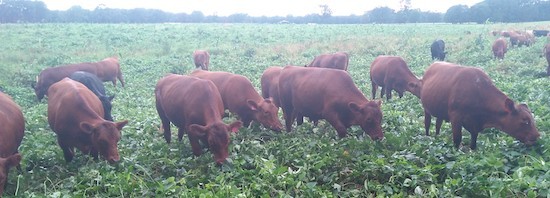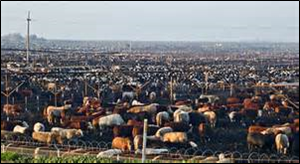Why Regenerative Ag Part 4
posted on
January 22, 2023
I hope you are enjoying our series on "Why Regenerative Agriculture" and it is making sense to you.
Remember, last week we discussed the nutrient cycle to include how Regenerative farming actually sinks carbon from the atmosphere back into the ground - a FREE solution that not only cleans the air, water, etc. ,but provides a food source for soil biology, plants, and animals? A documented example is WOP that sinks 3.4% of carbon or 100,000 pounds per acre year after year after year.
Contrast the Regenerative FREE solution to the Technology solution(s) projected to cost billions of dollars on businesses that will be passed to consumers in the form of higher energy bills, transportation cost, and ALL other areas of our daily lives. These people are pushing governments to pass laws that favor a tech solution because they stand to earn billions of dollars. But, they do not say what they will do with all of this sequestered carbon!
The solution must be a part of the cycles of nature where it does good!
Today's focus will be two-parts. First, a brief comparison between Pasture Based vs. Confined Animal Feeding Operation or CAFO.

This is a picture of our cows grazing at Nature's Gourmet Farm. Notice the open space, fresh air and sunshine. And, NO ODOR!!!
They are enjoying a diverse forage based diet ONLY that supports proper gut function - Never any grain that does not support proper gut function.
Grazing management is Adapted to current conditions and needs of the whole farm.
Manure & urine is spread across the pasture where it can be used to regenerate the soil and plants.
Mortality rate is ZERO. Visits are welcomed and encouraged.
Sadly, only about 5% of consumer food dollars support this type of animal agriculture.

Here is a picture of cows penned in one of more than 900 Confined Beef Feeding Operations in the United States. These cows are considered Grass-Fed & Grain Finished. Notice the following:
Cramped pens with concrete floors
Forced to lay in poop and urine. This alone creates huge ecological & pollution issues
Eat a bland GMO corn and soy based diet. Neither promotes gut health in cows because it is un-natural for them
NOT Regenerative
Animals are fed antibiotics to keep them alive
Mortality rate is 14.2 deaths per 1000 or >310,000 beef per year die in feedlot CAFO's
You can smell the (stink) feed lot miles away
You are NOT allowed to visit or ask questions
About 95% of food dollars support this type of animal agriculture
It does not matter if you are talking about beef, pork, chicken, or eggs the story is very similar. CAFO's are inhumane, ecological disasters. The way the animals are penned and fed does not support a healthy immune system - which is transferred to the people that consume their products.
The second part revolves around "Feeding The World" and will look at it from the Industrial Model vs. Regenerative Model.
Which model will carry the Earth's population the fartherest?
Well, if acres of land is the first thing we run out of or is the limiting factor then the Industrial Model will carry the Earth's population further.
However, what if land availability is NOT the limiting factor? Consider the impact these Complicated Systems can have as a limiting factor to feeding the world:
* Oil
* Water
* Chemicals
* Mineral nutrients
* Antibiotics - that pathogens are not alergic to
* Gulf Dead Zone
* Many more....
In each of these cases, the Regenerative Model is less dependent and will carry more people than the Industrial Model.
In fact, the longer land is farmed according to the Industrial Model the worse condition it becomes and thus the more chemical fertilizers, etc. it takes to make a crop.
With the Regenerative Model, the longer land is farmed regeneratively the stronger it becomes. The key is to follow the 6-Principles and 3-Rules to empower the 4-Ecosystem Processes so you can enjoy the abundance of Nature.
Big takeaway from today Regenerative Farming actually surpresses a LOT of carbon and uses it to feed soil biology, plants, and animals. Only Regenerative Farming offers a natural solution to the carbon problem. CAFO's are inhumane, ecological disasters. It does not matter if you are talking about beef, pork, chicken, or eggs the story is very similar. Lastly, unlike the industrial model, the longer you farm Regeneratively the soil gets better, and better, and better.
Thank you for supporting our Regenerative efforts with your food dollars. It does make a difference
As a reminder, we have an Old Fashioned Steak Sale through the month of January - straight from our Regenerative Farm.
There are FIVE steaks in this sale. All of our beef is Grass-Fed AND Finished (never any grain), free of chemicals and hormones...
1) Boneless Ribeye - sale price $15.30. Compare to Corner Market conventional beef at $17.99
2) NY Strip - sale price $13.30. Compare to Corner Market conventional beef at $15.99
3) Sirloin - sale price $8.80. Compare to Corner Market conventional beef at 11.99
4) Bone-In Ribeye - sale price $12.80. Save $1.45/lb.
5) T-Bone - sale price $12.35. Save $1.40/lb.
To receive the sale price you must order and take delivery BEFORE January 31st, 2023. Order early before the supply is sold out.
** Product Availability Update **
Chicken -Restocked Wednesday, December 28th. Next harvest date is February 14th with restock the following day
Eggs - Eggs are still tight. However, I have located and purchased about 650 pullets that have just started laying. They have to be NPIP tested to ship across state lines so we hope to have them on the farm the week of January 23rd. I also hope to bring most of the eggs they lay between now and then with me as well. YEAH!!!
Beef - Restocked December 23rd early afternoon. Next harvest is January 3rd with restock about January 24th
Pork - Restocked Dec 12th. Restocked sausages January 12th, 2023.
Lamb - Last harvest date was MONDAY, NOVEMBER 14th. Restocked Friday Nov 25th.




